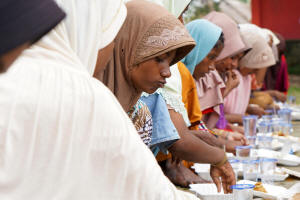|
The
19-year-old was among 174 surviving Rohingya in the overloaded
wooden fishing boat when it washed up on the shores of
Indonesia's Aceh province this week. Around 200 had been on
board, fleeing poverty and persecution, when it set off across
the Indian Ocean from Bangladesh on Nov. 21.
Of the 20 or more who died along the way, some leapt into the
water in desperation after the boat broke down and started to
drift, fearing it would sink.
"Three men jumped because they couldn't handle the hunger. Then
after 12 days water started coming into the boat," Fatimah told
Reuters.
"There were bodies floating in the water, here and there. We
couldn't do anything."
The Rohingya are a Muslim people from mainly Buddhist Myanmar,
where they have long suffered repression.
Since a crackdown by Myanmar's military in 2017, around 800,000
have been forced into Bangladesh, UN authorities estimate, but
thousands have fled increasingly desperate conditions in refugee
camps there.
Many try to get to Muslim-majority Indonesia, where the UN
refugee agency says nearly 500 Rohingya have reached land in the
past six weeks, or to Malaysia.
Indonesian authorities have been providing them with medical
assistance, food and temporary shelter, while working with
global refugee agencies to ascertain their legal status.
Fatimah now hopes to join her relatives in Malaysia, but she
doesn't know how or when.
"I just want to live comfortably," she said. "I hope I can live
well and be safe here."
(Writing by Zahra Matarani, Editing by Kanupriya Kapoor and John
Stonestreet)
[© 2022 Thomson Reuters. All rights
reserved.] Copyright 2022 Reuters. All rights reserved. This material may not be published,
broadcast, rewritten or redistributed.
Thompson Reuters is solely responsible for this content.

|
|




